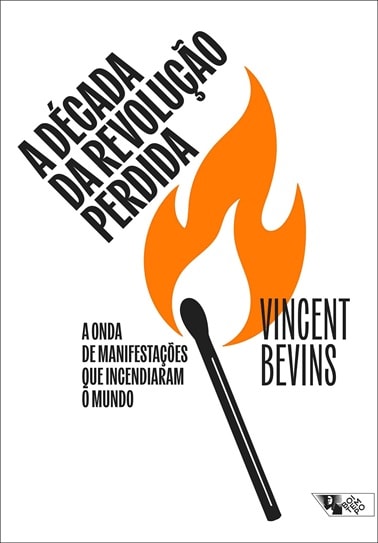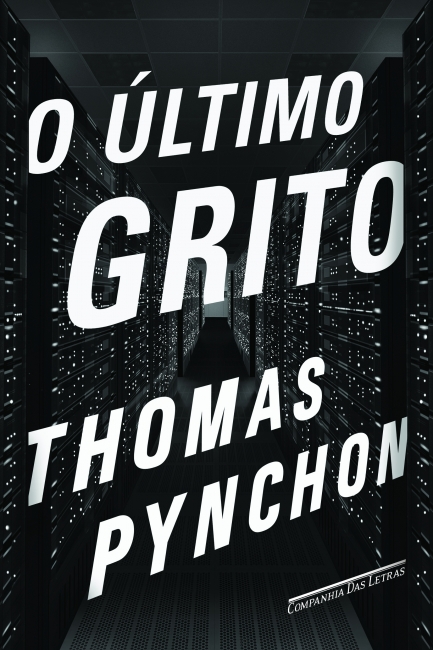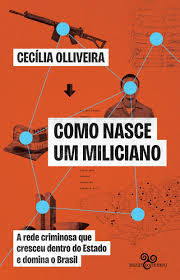sol2070 replied to Sally Strange's status
@[email protected] This is another on my list for quite some time. I think it was Cory Doctorow who recommended.
Costumo ler fic-spec, filosofia, sobre natureza, política, tech etc. Mais livros no blog → sol2070.in/livros Também escrevo ficção científica → fic.sol2070.in/ Mastodon → @[email protected] Clube do livro Contracapa → contracapa.club
This link opens in a pop-up window
@[email protected] This is another on my list for quite some time. I think it was Cory Doctorow who recommended.
Um dos prazeres de envelhecer é reler grandes obras apreciadas décadas antes. Como Crime e Castigo (Преступленіе и наказаніе, 1866, 608 pgs), de Dostoiévski.
Quem nunca leu pode imaginar que esse romance russo de 160 anos seja impenetrável ou irrelevante. Pelo contrário, é envolvente como uma novela da TV (não é que Dostoiévski seja novelesco, as novelas é que são dostoievskianas). Crime e Castigo foi publicado originalmente como um folhetim serializado numa revista, e as obras do autor tinham um público amplo quase como o da TV. Li a primeira vez praticamente adolescente e, mesmo na época, já tinha me cativado.
Lembro que Nelson Rodrigues, outro autor deliciosamente folhetinesco, costumava exagerar que não é preciso ler muitas autoras para escrever boas estórias, basta Dostoiévski, estando tudo ali. Mas a escritora que mais me levou a reler o russo agora foi Ursula K. Le Guin, cuja preocupação com a …
Um dos prazeres de envelhecer é reler grandes obras apreciadas décadas antes. Como Crime e Castigo (Преступленіе и наказаніе, 1866, 608 pgs), de Dostoiévski.
Quem nunca leu pode imaginar que esse romance russo de 160 anos seja impenetrável ou irrelevante. Pelo contrário, é envolvente como uma novela da TV (não é que Dostoiévski seja novelesco, as novelas é que são dostoievskianas). Crime e Castigo foi publicado originalmente como um folhetim serializado numa revista, e as obras do autor tinham um público amplo quase como o da TV. Li a primeira vez praticamente adolescente e, mesmo na época, já tinha me cativado.
Lembro que Nelson Rodrigues, outro autor deliciosamente folhetinesco, costumava exagerar que não é preciso ler muitas autoras para escrever boas estórias, basta Dostoiévski, estando tudo ali. Mas a escritora que mais me levou a reler o russo agora foi Ursula K. Le Guin, cuja preocupação com a ética em sua ficção foi muito influenciada por ele.
O livro conta a estória de Raskólnikov, um ex-estudante de direito que assassina uma idosa e sua filha para roubar. Poderia se passar tranquilamente hoje. Um feito impressionante é que a trama prende e envolve mesmo sendo majoritariamente psicológica. Mergulhamos no tormento mental do jovem.
Não só o protagonista, mas todas as personagens são muito vívidas, algumas fascinantes, como a santidade da prostituta Sonia ou o niilismo de Sridigailov.
Outro mérito do livro é justamente humanizar pessoas consideradas monstruosas, como Sridigailov ou o próprio Raskólnikov. Ao retratá-las como não tão distantes assim da “normalidade”, a estória tem uma qualidade de antídoto contra a rasa desumanização de pessoas consideradas inumanas.
Outra linha interessante e relevante está em uma das motivações do homicídio. O protagonista acredita num tipo de supremacismo (apesar de não usar essa palavra), em que “pessoas extraordinárias” — como Napoleão Bonaparte — não precisam se conformar às leis e normas sociais, porque sua capacidade de realizar grandes feitos seria muito maior do que eventuais deslizes considerados imorais. Submeter-se ao julgamento alheio seria coisa para a massa de ignorantes. Claro que Raskólnikov se coloca entre a minúscula porção extraordinária da humanidade (tal supremacismo talvez nunca tenha sido tão intenso quanto o que vemos na atual classe de bilionários).
Entretanto, no final, ele reconhece que não é assim especial, ficando sugerido que talvez ninguém seja. O livro poderia ser sintetizado nisso: a tragédia de alguém que foi até o fim nesse supremacismo de se ver acima de todas as outras pessoas.
O que mais assombra é que, na verdade, não fica inteiramente claro porque ele cometeu o crime. Tal tentação poderia afligir qualquer pessoa. Como diz o crítico literário Harold Bloom (em Como e Por que Ler):
Não consigo ver como um leitor comum, de mente aberta, poderia definir, com um mínimo grau de certeza, a motivação das transgressões de Raskolnikov, no sentido corrente da palavra “motivação”. A perversidade, tão arraigada em Svidrigailov, lago e Edmundo, ocupa pouco espaço nas psiques de Raskolnikov e Macbeth, o que torna a queda desses personagens ainda mais aterrorizante.
Os motivos já citados de porque o livro envolve também podem ser vistos como falhas. Há frequentes explosões de emoções e sofrimentos na beira do melodrama. Não só não é sutil como os sentimentos são minuciosamente explicados e comentados. Bloom também diz:
Por mais envolvente, o romance Crime e Castigo não deixa de ser um tanto tendencioso, falha sempre presente em Dostoiévski, autor aguerrido, cuja perspectiva contundente fica sempre explícita em tudo aquilo que escreve. Seu propósito é soerguer-nos, como Lázaro, do nosso niilismo ou ceticismo, e converter-nos à Ortodoxia. Eminentes escritores, como Tchekhov e Nabokov, não o toleravam; para tais escritores, Dostoiévski não era um artista, mas um pseudoprofeta de voz estridente.
Imagino se o motivo disso não seja a aspiração do autor de atingir um público maior, do mesmo modo que novelas televisivas hoje — não tem como haver muita sutileza aí. Focar apenas nesse aspecto seria subestimar Dostoiévski.
Li a bela edição da editora Martin Claret, em que o tradutor Oleg de Almeida recriou muita da linguagem arcaica do romance. Já a edição da Todavia, traduzida por Rubens Figueiredo, me pareceu, lendo as primeiras páginas, mais direta e contemporânea.

Clássico de Dostoiévski e romance fundamental da literatura ocidental, CRIME E CASTIGO ressurge em toda sua originalidade e inesgotável caráter …
A Década da Revolução Perdida (If We Burn, 2023, 344 pgs), de Vincent Bevins, narra, contextualiza e analisa a onda de protestos mundiais entre 2010 e 2020, com destaque para o Brasil em 2013.
O título faz referência ao fato de que a maioria desses levantes terminou mal, não levando a mudanças duradouras, ou até piorando o que já era ruim.
Vincent foi correspondente do jornal Los Angeles Times no Brasil, entre 2011 e 2016, além de ter coberto alguns desses protestos em massa pelo mundo. Para o livro-reportagem, também foram entrevistadas diversas das pessoas que ajudaram a organizar os movimentos e especialistas. Mas a experiência pessoal do jornalista ainda é o elemento cativante.
Dez levantes são analisados mais detalhadamente: na Tunísia, Egito, Bahrein, Iêmen (a chamada Primavera Árabe), Turquia, Brasil, Ucrânia, Hong Kong, Coréia do Sul e Chile. Características comuns desses movimentos massivos foram a horizontalidade (ausência …
A Década da Revolução Perdida (If We Burn, 2023, 344 pgs), de Vincent Bevins, narra, contextualiza e analisa a onda de protestos mundiais entre 2010 e 2020, com destaque para o Brasil em 2013.
O título faz referência ao fato de que a maioria desses levantes terminou mal, não levando a mudanças duradouras, ou até piorando o que já era ruim.
Vincent foi correspondente do jornal Los Angeles Times no Brasil, entre 2011 e 2016, além de ter coberto alguns desses protestos em massa pelo mundo. Para o livro-reportagem, também foram entrevistadas diversas das pessoas que ajudaram a organizar os movimentos e especialistas. Mas a experiência pessoal do jornalista ainda é o elemento cativante.
Dez levantes são analisados mais detalhadamente: na Tunísia, Egito, Bahrein, Iêmen (a chamada Primavera Árabe), Turquia, Brasil, Ucrânia, Hong Kong, Coréia do Sul e Chile. Características comuns desses movimentos massivos foram a horizontalidade (ausência ou redução de hierarquias), espontaneidade e organização via redes sociais.
O que aconteceu no Brasil ilustra bem como a coisa terminou mal. Protestos do Movimento Passe Livre (MPL), de orientação anarquista, exigiam a redução do preço do transporte público. Cresceram muito em 2013, e o governo acabou atendendo a demanda. A intensa cobertura da mídia fez o número de participantes explodir, entretanto, sem muito alinhamento com a causa inicial.
Esse clamor público foi meticulosamente sequestrado por movimentos de direita como o MBL (sigla que intencionalmente imitava MPL) e Vem Pra Rua, que se disfarçavam de jovens, apartidários, descolados e descentralizados, mas que tinham financiamento de organizações conservadoras e neoliberais dos EUA. Conseguiram instrumentalizar perfeitamente aversões populares como o ódio a políticos corruptos ou até a qualquer entidade política. Esses protestos foram decisivos para o impeachment de Dilma Roussef, a eleição de Bolsonaro e a ascensão da extrema-direita.
A perspectiva de alguém de fora sobre o Brasil traz um respiro refrescante em meio à cobertura viciada da mídia nacional, do tipo “como explicar para um alienígena recém-chegado o que está acontecendo”.
Nos outros países, houve situações parecidas, em que estruturas impopulares foram derrubadas, mas o vácuo deixado foi sequestrado por grupos políticos sem nenhum compromisso com as mudanças, ou na verdade, comprometidos em piorar a situação da maior parte da população.
Só não gostei dos dois capítulos finais, em que o autor expõe suas conclusões e a de especialistas. A qualidade descentralizada e horizontal dos movimentos teria sido a principal fraqueza, responsável por no fim não apenas impedir o êxito dos movimentos, mas até trazer pioras sociopolíticas.
Apesar de não declarar explicitamente, o jornalista não esconde sua simpatia por essa visão marxista-leninista, em que seria essencial uma “vanguarda” centralizadora de líderes e representantes para realmente efetivar uma revolução.
Claro que houve falhas e erros nesses movimentos descentralizados — muitas das jovens ativistas estavam fazendo isso pela primeira vez. Mas a exposição do autor não convence de que o oposto (a centralização e partidarização), sim, funcionaria. Basta olhar as revoluções marxistas históricas para constatar onde terminaram: os meios da revolução como hierarquia e centralização contaminaram os fins, criando autoritarismo e abuso de poder.
Na conclusão, o levante popular no Chile entre 2019 e 2020 chega a ser classificado como uma exceção vitoriosa, já que a coisa desembocou na política tradicional assumindo as rédeas — só com tal aliança seria possível mudanças positivas estáveis.
Entretanto, o rascunho da nova Constituição foi rejeitado e os movimentos sociais perderam fôlego. Muita gente se sentiu traída pelos líderes dos protestos que enveredaram pela política partidária e seus conluios, como o atual presidente Gabriel Boric. Do ponto de vista horizontal e descentralizado, ceder à estrutura política dominante é que foi o erro.
No final, é até sugerido que, caso um movimento não esteja muito bem estruturado (ou seja, hierarquizado com seus líderes e “vanguardas”), o melhor é nem tentar nenhuma rebelião ou protesto, sob o risco de as coisas piorarem. Essa pérola se destaca porque é o que dizia Edward Burke, em 1790, o pai do conservadorismo: qualquer tentativa de mudança é perigosa e prejudicial.
Contudo, esse final não compromete. No conjunto, é uma prodigiosa grande-reportagem.
Li a versão em inglês.

Da chamada Primavera Árabe ao Gezi Park, na Turquia, passando pelo Euromaidan, na Ucrânia, às rebeliões estudantis no Chile e …
( sol2070.in/2025/07/livro-o-ultimo-grito-pynchon/ )
O Último Grito (Bleeding Edge, 2013, 584 pgs) é o mais recente romance publicado de um autor predileto: o recluso Thomas Pynchon.
Uma das mais consagradas vozes literárias dos EUA, Pynchon é o grande romancista da paranoia. Suas estórias mergulham quem lê naquela condição visionária ou doentia onde tudo parece outra nítida peça de uma espantosa e, no fim, impenetrável conspiração. Em meio a humor no limite do pastelão, drogas, sentimentos antissistema e/ou anárquicos, e referências culturais que cobrem indiscriminadamente todo o espectro — desde cenas de filmes antigos, animes, canções country, heavy metal, filosofia, passando por videogames e programas do Windows, até óperas clássicas.
A estória é sobre alguns meses antes e depois do atentado terrorista às torres gêmeas em Nova York, em 2001, na vida de Maxine, uma investigadora de fraudes financeiras especializada em startups digitais, que viviam o pós-estouro da bolha da …
( sol2070.in/2025/07/livro-o-ultimo-grito-pynchon/ )
O Último Grito (Bleeding Edge, 2013, 584 pgs) é o mais recente romance publicado de um autor predileto: o recluso Thomas Pynchon.
Uma das mais consagradas vozes literárias dos EUA, Pynchon é o grande romancista da paranoia. Suas estórias mergulham quem lê naquela condição visionária ou doentia onde tudo parece outra nítida peça de uma espantosa e, no fim, impenetrável conspiração. Em meio a humor no limite do pastelão, drogas, sentimentos antissistema e/ou anárquicos, e referências culturais que cobrem indiscriminadamente todo o espectro — desde cenas de filmes antigos, animes, canções country, heavy metal, filosofia, passando por videogames e programas do Windows, até óperas clássicas.
A estória é sobre alguns meses antes e depois do atentado terrorista às torres gêmeas em Nova York, em 2001, na vida de Maxine, uma investigadora de fraudes financeiras especializada em startups digitais, que viviam o pós-estouro da bolha da internet. Ela entra num buraco de coelho de Alice ao investigar um tecnobilionário com ligações tanto com o governo quanto com terroristas.
Gostei especialmente por ser a chegada do mundo digital na imaginação desvairada do autor. Tem até uma pegada cyberpunk, cheia de hackers, contrabando de informação, o poder exponencial das tecno-corporações, além de um universo virtual viciante que é uma mistura de Second Life com deep web.
Também fala mais de família e casamento, de modo bastante terno, sem perder o norte cáustico. E não deixa de ser uma efusiva homenagem à cidade de Nova York, que fica parecendo um outro mundo, com seus estabelecimentos únicos, subculturas, modas, tribos e máfias.
Mesmo tendo me perdido em muitas das referências — principalmente termos judaicos ou de filmes em preto-e-branco —, pra mim foi um banquete. Ainda mais sendo uma tradução de Paulo Henriques Britto (o único tradutor que me faz comprar o que traduziu).
Entretanto, assim como no livro anterior (Vício Inerente, 2009), não foi a experiência impactante dos primeiros romances Arco-Íris da Gravidade (1973) e O Leilão do Lote 49 (1966) — quero reler, talvez tenham me marcado mais por ter lido bem jovem.
Superficial e inicialmente, O Último Grito pode parecer uma estória de detetive, mas quem ler com essa lente vai se decepcionar. É basicamente… pynchoniano.
Em outubro, vai sair o décimo romance de Pynchon: Shadow Ticket. Antes, em setembro, chega outra adaptação para as telas de Paul Thomas Anderson: One Battle After Another, baseado no lindo Vineland (1990). Anderson também adaptou Vício Inerente, em 2014.

As ameaças e contradições do século digital em um romance surpreendente.
Meses antes do ataque terrorista contra as Torres Gêmeas, …
( sol2070.in/2025/07/livro-como-nasce-um-miliciano/ )
No livro-reportagem Como Nasce um Miliciano (2025, 216 pgs), Cecília Oliveira retrata o submundo das milícias cariocas, a partir de uma chacina em 2020, em que um ex-PM, famoso líder miliciano, foi executado.
A reportagem documenta, por exemplo, como a ideia de que milícias detêm um poder paralelo não é exata, já que a participação e cumplicidade de servidores públicos como policiais predomina, além da aliança com políticos, entre outros. Na verdade, cidades e bairros dominadas por essas gangues refletem o próprio Estado.
Narra também como os antigos “esquadrões da morte” foram se adaptando, explorando novas parceiras e setores até o formato atual.
Cheguei no livro por esse episódio do podcast Ilustríssima Conversa, estando mais interessado nas histórias de vidas desses criminosos. Nisso, decepcionou um pouco. A investigação entra pouco em detalhes do tipo. Com a exceção do capítulo final, que comenta a admiração e respeito …
( sol2070.in/2025/07/livro-como-nasce-um-miliciano/ )
No livro-reportagem Como Nasce um Miliciano (2025, 216 pgs), Cecília Oliveira retrata o submundo das milícias cariocas, a partir de uma chacina em 2020, em que um ex-PM, famoso líder miliciano, foi executado.
A reportagem documenta, por exemplo, como a ideia de que milícias detêm um poder paralelo não é exata, já que a participação e cumplicidade de servidores públicos como policiais predomina, além da aliança com políticos, entre outros. Na verdade, cidades e bairros dominadas por essas gangues refletem o próprio Estado.
Narra também como os antigos “esquadrões da morte” foram se adaptando, explorando novas parceiras e setores até o formato atual.
Cheguei no livro por esse episódio do podcast Ilustríssima Conversa, estando mais interessado nas histórias de vidas desses criminosos. Nisso, decepcionou um pouco. A investigação entra pouco em detalhes do tipo. Com a exceção do capítulo final, que comenta a admiração e respeito sociais de que um miliciano goza, sendo esse um fator-chave para que PMs aspirem pela carreira criminosa. Há até quem preste concurso pra policial já sonhando com milícia.
A obra é curta, rápida também na abordagem, levando em conta que é um livro e não uma reportagem noticiosa. Não que desmereça, mas quem esperar uma grandiosa reportagem mais imersiva pode se decepcionar.
Achei particularmente valioso porque há pouca cobertura da mídia sobre essa situação alarmante e distópica.

Em um Rio de Janeiro dividido por territórios invisíveis, Cecília Olliveira, um dos principais nomes do jornalismo investigativo do país, …
( sol2070.in/2025/07/livro-as-sereias-de-tita/ )
As Sereias de Titã (1959, 304 pgs) é uma saborosa sátira de ficção científica do consagrado autor estadunidense, um dos poucos exemplos cuja literatura furou a bolha sci-fi em sucesso geral de público e crítica.
Um hedonista milionário encontra uma pessoa que sofreu um acidente extradimensional, e sua vida termina revirada em uma conspiração multiplanetária.
Comédia de ficção científica não é minha praia, mas Vonnegut é uma memorável exceção, com seu humor ácido que não perdoa a sociedade e cultura norte-americanas. Apesar de ter sido escrito nos anos 50, as tiradas continuam atuais, já que a época também era de tecno-otimismo ultraconsumista e governantes cínicos.
Em termos de sub-gênero FC, chega a ser proto-new-wave, antecipando as doideiras e o inconformismo da sci-fi dos anos 60 e 70, chamada de “New Wave”.
Há aquele sabor pulp, de ficção barata, dessas estórias mais antigas, mas a alma subversiva e …
( sol2070.in/2025/07/livro-as-sereias-de-tita/ )
As Sereias de Titã (1959, 304 pgs) é uma saborosa sátira de ficção científica do consagrado autor estadunidense, um dos poucos exemplos cuja literatura furou a bolha sci-fi em sucesso geral de público e crítica.
Um hedonista milionário encontra uma pessoa que sofreu um acidente extradimensional, e sua vida termina revirada em uma conspiração multiplanetária.
Comédia de ficção científica não é minha praia, mas Vonnegut é uma memorável exceção, com seu humor ácido que não perdoa a sociedade e cultura norte-americanas. Apesar de ter sido escrito nos anos 50, as tiradas continuam atuais, já que a época também era de tecno-otimismo ultraconsumista e governantes cínicos.
Em termos de sub-gênero FC, chega a ser proto-new-wave, antecipando as doideiras e o inconformismo da sci-fi dos anos 60 e 70, chamada de “New Wave”.
Há aquele sabor pulp, de ficção barata, dessas estórias mais antigas, mas a alma subversiva e o dom de contador de estórias ainda se sobressaltam mesmo em meio às imaginações científicas da época, como a noção de colônias em Marte. Isso é até bem compreensível, já que apenas em 2008 foi descoberto que o solo do planeta é altamente tóxico, entre outras condições que descartam a habitabilidade (apesar de ainda haver gente que insiste na ideia).
Vonnegut era veterano da Segunda Guerra e a estória explora bastante a lavagem cerebral do mundo militar.
Também não é só humor corrosivamente crítico. O enredo se entrelaça com temas profundos como livre-arbítrio ou sua ausência, e propósito humano, além de um tocante retrato de famílias e amizades despedaçadas. Há até intervenção cósmica.
Não sei porque fui demorar tanto pra ler Vonnegut. Talvez tenha o sido o preconceito contra a FC de humor — autor quadrado fazendo piada pra mim é algo difícil.
Já se tornou um de meus autores clássicos prediletos.

Quando Malachi Constant, um irreparável milionário fanfarrão, recebe a profecia de que viajará pelo espaço e terá um filho com …
@[email protected] Good to know! Many authors praise as a post-apoclyptic modern classic, but it was completely out of my radar.
( sol2070.in/2025/07/grande-sertao-veredas/ )
Essa é a edição de Grande Sertão: Veredas (1956, 560 pgs), de Guimarães Rosa, que guardo há 30 anos — meu recorde de tempo de um livro esperando na fila de leitura.
Comprei adolescente, seduzido por essa edição comemorativa da Nova Fronteira, mas nunca consegui ler. Provavelmente foi melhor assim, já que se tivesse lido muito jovem não teria apreciado como agora.
A barreira inicial costuma ser a linguagem, uma recriação poética e hiperbólica — repleta de corruptelas, nomes quiméricos, palavras inventadas, populares ou até cultas — do linguajar de jagunços do norte mineiro, abrangendo também Goiás e Bahia, de uns 80 anos atrás. Mas, como disse um crítico após o lançamento da obra-prima, basta perseverar por umas 50 ou 100 páginas que a coisa começa a se abrir e encantar.
Toda a estória é contada oralmente pelo cativante ex-jagunço Riobaldo num jorro só, sem interrupção ou …
( sol2070.in/2025/07/grande-sertao-veredas/ )
Essa é a edição de Grande Sertão: Veredas (1956, 560 pgs), de Guimarães Rosa, que guardo há 30 anos — meu recorde de tempo de um livro esperando na fila de leitura.
Comprei adolescente, seduzido por essa edição comemorativa da Nova Fronteira, mas nunca consegui ler. Provavelmente foi melhor assim, já que se tivesse lido muito jovem não teria apreciado como agora.
A barreira inicial costuma ser a linguagem, uma recriação poética e hiperbólica — repleta de corruptelas, nomes quiméricos, palavras inventadas, populares ou até cultas — do linguajar de jagunços do norte mineiro, abrangendo também Goiás e Bahia, de uns 80 anos atrás. Mas, como disse um crítico após o lançamento da obra-prima, basta perseverar por umas 50 ou 100 páginas que a coisa começa a se abrir e encantar.
Toda a estória é contada oralmente pelo cativante ex-jagunço Riobaldo num jorro só, sem interrupção ou divisão em capítulos. Em meus frequentes momentos de desconexão ou distração, por ser algo tão diferente do que leio, bastava imaginar que ele estava na minha frente falando para trazer de volta o interesse magnético. Assim, a leitura não deixou de ser também um austero exercício de concentração e presença, com recompensa magnífica.
O enredo demora a decolar, em meio a causos e falsas partidas que vão dando um esquenta e aclimatando sobre o que virá. Depois que deslancha, se torna mágico e profundo, sem descartar o pitoresco e a aventura.
Há três temas essenciais:
O cenário é um sertão do Cerrado que transcende a natureza exuberante em direção ao mítico e fantástico.
Recomendo bastante a leitura do ensaio “O homem dos avessos” (1957), em que o lendário crítico literário Antônio Candido analisa a obra, incluído em Tese e Antítese. Ajuda a absorver melhor as múltiplas camadas.
Na superfície, é uma aventura regional bem brasileira, de rica inventividade estilística.
Também é um lendário “romance de cavalaria”, como os medievais da Távola Redonda, com todos seus mitos e rituais, porém tudo à brasileira.
E há uma camada psicológica profunda. Riobaldo é contumaz em seu questionamento se o demônio existe. Prefere negar, quase como um autoconvencimento. Estaria então dentro de cada pessoa? Além disso, há a paixão pelo companheiro Diadorim.
Como diz Candido:
A experiência documentária de Guimarães Rosa, a observação da vida sertaneja, a paixão pela coisa e pelo nome da coisa, a capacidade de entrar na psicologia do rústico, tudo se transformou em significado universal graças à invenção, que subtrai o livro à matriz regional para fazê-lo exprimir os grandes lugares-comuns, sem os quais a arte não sobrevive: dor, júbilo, ódio, amor, morte — para cuja órbita nos arrasta a cada instante, mostrando que o pitoresco é acessório e que na verdade o Sertão é o Mundo.
Camadas internas
Não tem muito sentido alertar sobre spoilers em uma obra tão consagrada, parte até do currículo de vestibulares. Quem for ler provavelmente já sabe das reviravoltas e conclusão. Mas alerto. Segue a minha leitura da camada mais profunda e psicológica, repleta de spoilers. → sol2070.in/2025/07/grande-sertao-veredas/

Publicado originalmente em 1956, Grande sertão: veredas, de João Guimarães Rosa, revolucionou o cânone brasileiro e segue despertando o interesse …
@[email protected] On my list for some time!